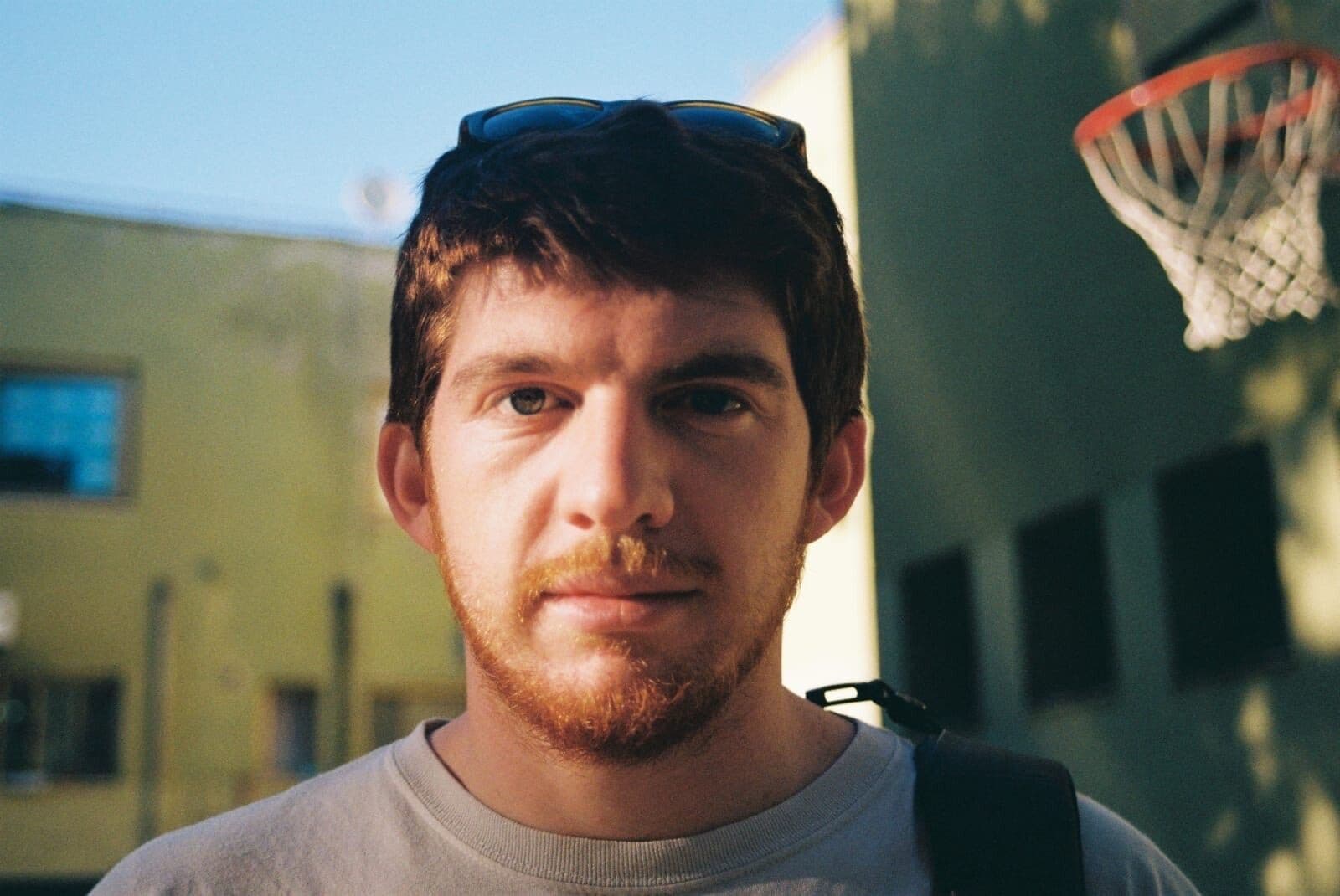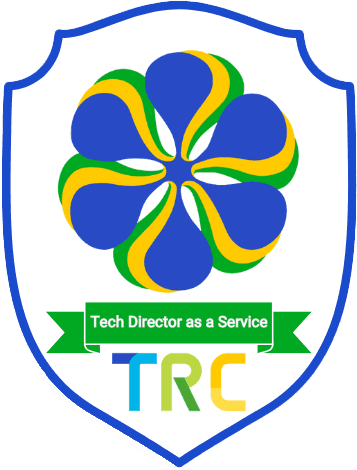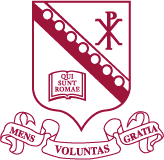CEO SUMDAYZ FESTIVAL

Where are you from, and what brought you to Rome?
I was born in Milan. My mother is American, from California, and my father is Roman. So I'm half Italian, half American. I've spent most of my life living in Rome because I moved over when I was in first grade, so I did the whole Roman international school experience. I attended Ambrit from first through eighth grade and then came to St. Stephen's.
Wonderful. Can you describe your experience at St. Stephen's?
St. Stephen's was amazing. There are ups and downs at that age, but it was mostly a joyous, full moment of my life. There are various memories that come to mind, from hanging out with friends after school at Orange Garden to football three days a week and football trips. I think my favorite moments were always on trips. The trips were incredible. I went to Morocco my first year and Senegal my last year. St. Stephen's gives you these fantastic opportunities to explore these unique places which you wouldn’t typically get the chance to visit. I think what I enjoyed about it was that the groups included mixed grade levels so frequently that you wouldn't even know everyone at the start. By the end, you're hanging out with everyone, everyone getting along, and these sorts of experiences that bring students outside of the school environment to have adventures together were the best parts of my time at the school. There was also a really good group of teachers. Conversing with them was always valuable. I liked going after school, speaking with some of my mentors, and confronting each other. So, if I had to make a grid, I would say that school trips were my favorite experiences, and then everything that came from confronting others in the school environment, those were the moments that stimulated me the most.
I couldn't agree with you more. After you left St. Stephen's, what came next for you?
I moved to London to study International Management at Kings College. I spent four years there because I did a work placement in year three. I lived in London for almost five years because I finished university, stayed in London, and then COVID-19 hit, and I came back here [to Rome] as a result. I was working in the events industry in London, so it had become quite tolling and unsustainable. There were also the complications that arise living in a city like London, which is so dispersive. Before COVID, it was already difficult to see people and maintain that social aspect, so I decided to move back to Rome, and I think it was the right choice at the end of the day because it led to a big new project getting kicked off.
I want to ask you about your new project, but first, we should mention that you have started multiple companies in the past few years. Did you always know that you wanted to be an entrepreneur, or was it something you fell into?
I think I had a bit of a calling since I was young, without a doubt. It was always in the back of my mind. I was fascinated since I was young with the idea of being self-employed and not working for someone per se and also the idea of creating something new, the concept of coming up with an idea, developing it and making it come to life, which I think is the most satisfying part of being an entrepreneur because you build something from the ground up. I think the most special part of that is being able to employ people. So from an idea, you go to being able to give jobs to people and a life purpose. I think that is what has always fascinating to me. Back when I was in Ambrit, in sixth grade, I started a business with a friend of mine where we would buy American candy at the commissary and sell it at Ambrit for a markup. We were scared that the school would [laughs] get angry with us. And I remember, at one point, we got called into the Principal's office, and we were like, "we're done for." But she placed an order for some root beer. I still remember. So we were super excited about that. That was my first entrepreneurial experience. And then, ever since, there was always some little project, the car wash in the summer or something else. So I think it was always in my DNA. Also, my father started his own company, so I think that was also in the back of my mind a little bit. I definitely had that calling since I was young.
I'm glad you shared that story because I think many of us can relate to relying on commissaries for our favorite international foods.
And the only reason the business failed was that they scrapped the commissary out of nowhere which was a sad day.
That is too bad. So, now I would like to ask you about your latest project, SUMDAYZ. The goal of the SUMDAYZ Festival is to create the "most experiential music festival currently accessible in Italy." The festival will take place in Rome on September 10th and 11th, 2022. How did you and your co-founders come up with this idea for this festival?
I've been interested in music festivals since I was in university. I had a past project in the events industry, and every time I stopped and thought about what I wanted to do, the word "festival" would sort of pop into my mind. I wasn't sure in what shape or form but it would always come into play. First of all, I'm an avid festival-goer myself, and that's probably the main thing that led me down this path. I also believe that festivals are a really interesting way for people from all over the world to come together and have a shared experience because when you go to a festival, all you have in your mind is just letting yourself go and having fun, socializing, and communicating with people which may come from entirely different backgrounds or completely different worlds. So I think that's what I've always found fascinating about the festival industry and what sort of was the goal from the start. So in January 2021, mid-COVID, I was having a tough time, and I thought, "it's time to start a new chapter." That new chapter came in the form of the festival, and I was also thinking very logically about the fact that there would soon be a wave of enthusiasm with things reopening.
That was an important thing to use to one's advantage because I'd always done these events, which were decently sized and all but not fully experienced based. I would rock up to a club or rock up to an event hall and do the event, have my fun and go back. And that would be the end of it. Whereas here the project is: you go, you have a full 12-hour experience, you can do lots of other activities on top of just going to the event itself and dancing, which maybe some people are less excited about. We're three co-founders. One of my two co-founders is my absolute best friend, Vincent, my closest friend from when I was really young, and we always had this dream together, and the other is Will, a dear friend whom I met while working on the previous project called "True Passion" in London, and we decided to create this dynamic trio. We complement each other in terms of our skillsets and problem-solving approaches. So, we sat down and decided, "okay, let's get this going." We had little knowledge about what festivals actually would require and so forth. We jumped in headfirst, and the funny thing is we decided to do it in this paper mill called "City Lab," but we had already organized two full festivals because initially, it was meant to be in a castle outside of Rome; this nice space but we didn't get the necessary licenses because it was a historical castle that couldn't withstand a full event happening there and then also COVID complicated things last summer when they had initially opened venues and then closed them again.
So we scrapped, unfortunately, that idea after working on it for many months, and then we moved to Cinecittà, the movie studios. We planned it all out there, and then due to contractual issues with the venue itself, we had to scrap that, which was another six months of work. Obviously, you don't start from zero every time, but it also takes a mental toll. Finally, we managed to close the deal with the paper mill, develop the project we had already announced and start selling tickets. So it took many steps and trial and error to get here. We kicked this off in our lonely COVID moments when we were fantasizing about what would come afterward. I think the timing was right because now we feel that enthusiasm, and we're hoping to take advantage of that because it feels like everyone's excited and eager to have fun again.
So you mentioned that the idea for the festival came to you and your co-founders during COVID. Previously, you had been the CEO of a different company, True Passion, which has essentially connected different creative panoramas under one platform, everything from content production and editing to event hosting. How did your experience founding True Passion prepare you for SUMDAYZ?
So I would say it was that first experience when you're sort of young and foolish, and you just jump all in. You do things with less logic and less structure and so forth, but it was an incredible experience because it was the first time we had to deal with people that were vastly different from us. For example, having to confront ourselves with usually middle-aged Italian men, which comes with all the stereotypes of that subset of the population, was challenging. It was really all on us, all on our back. And we were in four, four co-founders of True Passion, and we were a bit of a production team. So I put my hands on many different skills that I didn't have quite developed. I'd go and shoot a music video, and then I'd go and organize an event, and then we'd go and create a merch stand at a bazarre or something. So it was very vastly different things that required vastly different skill sets. It really helped me develop in that sense. And then going through the whole process of opening a company, managing the company, the books, and so forth, and this was all during uni. So it was a time that was full but also really stimulating and entertaining. But then, when you're young like that, maybe you work less well, and all the things that were lacking in that first experience, all the lessons learned, were brought into this new project. I felt so much more in control and so much more knowledgeable about what I was doing just because of True Passion's experience. It was an essential step.
Yeah, absolutely. And I can see that the multidisciplinary approach of True Passion is also present in SUMDAYZ Festival because it's not just a traditional music festival. I noticed that you plan to have art exhibitions and an artisanal market. Why did you decide to add these elements to your music festival?
Those elements are exactly the ones that I think will give that feeling of a 360-degree experience. It's a way to cater to people who might not be as excited about the music or those who want to see what else is out there beyond the music itself. At the same time, it gives opportunities to young, like-minded people to show off their skills. Two or three different young artists will curate the digital art room, and each one will have a different experience within the space. We're also going to be using hologram art. We're also going to be making projections. We will use different led screens, and it's all going to be quite tech-based, riding the NFT wave, in a sense. At the same time, we wanted to provide physical space for objects as well, and that's where the artisans come in, all the young artisans are doing stuff around the music industry. Each one will have space to expose their stuff and show off to a crowd that might not necessarily interact with them as much. The area has many rooms, and you can walk in and walk out from different doors. There will also be food trucks and food experiences in the back of the venue, and in order to get there, you have to pass through the digital art exhibition or the bizarre so that will create a flow of people going to eat something and going and watching an exhibition and then maybe walking through the market and then going to dance, so it becomes a little more dynamic and a little less flat. And again, in order to entertain people for that many hours, it's good to have options that aren't just standing near the stage and dancing but also moving around in a creative environment.
So, when people think of music festivals, they may not necessarily think of Rome, a city famous for its ancient history. Why do you and your co-founders believe that Rome is the right place for your festival?
Well, that's super interesting. I think Rome has a lot of potential. It has a lot of potential mainly because of a real lack in the market of offerings. There's very little competition when it comes to festivals--there's no competition. This would be sort of a first European-style electronic music festival. There are a lot of concerts in Rome. There are a lot of big events, but there are no events that last many hours, starting in the day and going into the night for multiple days. So there's a big hole in the market. When I was young, I experienced this first half. There isn't that much going on in the city, especially in the nightlife arena. So coming in with this project in a city like this, we think this will make a big statement. There's also not that much offered because it's a very complicated city to do business in.
We saw Rome as the perfect place because it's the capital, there are many young people, but there's nothing of this sort so entering a market like this would require a little bit less money and a little bit less reputation than going into a market like London where it's super saturated, full of offers and people are likely to gravitate towards the name they recognize versus in Rome it's a bit of a blank slate. So the first part of the project started because of that, and then the other big part is that there's so much tourism created with festivals. I myself will fly maybe to one or two countries over summer to go and have a weekend-long experience and usually they're more remote places where there may not be much offered other than the festival itself so my thought was, Rome's a beautiful city, it's already an amazing location visited by many people, why not add to that package and offer the opportunity also to enjoy a part. There are young people who may never come to Rome but can now say, "why don't I spend a week in Rome visiting the city and going to this festival?" So I think all these elements led to Rome being the right place to start the project. It doesn't mean that we're going to be here forever, but we are probably going to always have a presence here. We hope that the project is continuous, and this is the first edition of many. We see ourselves expanding into other countries as well, or at least other cities, but to kick it off, I think Rome is the place where we can build most of our reputation. We can really make a difference to the real nightlife of the place and change the clubbing culture in a sense, which is our objective ultimately as well.
You make an excellent point. Rome is not known for its nightlife, and young people traveling often search out experiences that go beyond the typical "touristic" offerings. So, stepping back, looking big picture at the path you've followed since St. Stephen's and your experiences with these two companies, do you feel you have followed a relatively straightforward path, or have there been twists and turns along the way?
You know, it's never a straight path in anything you do. Still, at the same time, I do see a bit of linear progress in my personal work life, kicking it off with small events when I was at St. Stephen's, organizing After Prom, doing stuff like that, maybe two events a year in those years to then doing bigger things with True Passion during my uni career. And then right after doing my most significant events right before COVID, the year between the two, to then being completely blocked and taking a step back and evaluating what I wanted, what I enjoyed of the work I was doing, what I didn't enjoy and so forth and then making the decision to open the festival. So in a sense, there were definitely moments in which I stepped back and reflected. I think I tend to jump in quite hard in these sorts of projects and I do enjoy going all out but at the same time [it's important to have] those moments where you step back, reflect, understand, and decide what really matters within the world or within the experience that you're having. True Passion, for example, is an amazing project, and I really enjoyed it, but I realized it's not really the music industry, and the collaborators working in that industry were not necessarily the people I wanted to be working with and so taking a step into [the world of] electronic music, which is much more my cup of tea, was a breath of fresh air. And I really felt that difference.
So even just being able to step back and say, this isn't quite the fit for me, and having the courage to leave something that is still a fun project with friends, it was tough to take that step back. I was on what felt like a linear path; I took that step back and jumped onto another rail, which is similar, but vastly different. At the same time, I struggled a lot during the period I was studying and working because I was really eager to work. I've never been particularly into institutions. I have always been a little bit rebellious. So those were the moments in which I was struggling, where I had a project going that was stimulating to me but at the same time had obligations on paper that I had to get done. It was always challenging and interesting to balance the two and to know when it was time to jump back on the uni wagon or dedicate all my time to my projects, if you know what I mean.
Absolutely. It's hard to balance work with your studies.
Yeah. I always felt that. And then in terms of the actual projects themselves. For this festival, I developed three different festivals and three different locations, and that's all because of bureaucracy and licenses; bureaucracy first and foremost because Rome is such a complicated city to navigate. Even just the politics of Roman nightlife, where there are unspoken rules and unspoken balances of people that manage the whole thing. You have to move in a very political way, specifically in this industry, and I think in life in general, but wow, this area really has a lot of internal power struggles and internal dynamics that other industries I don't think have [to the same extent] at least in my personal experience. So there are a lot of challenges, in general, to get the project going. And that's also probably why there isn't that much offered in this realm because it really isn't as straightforward as it is in other cities and in other counties.
Yes, I think Rome has to be one of the most difficult places in the world to launch a start-up.
Yeah, I think so. And not only because they don't really offer a lot of support in terms of governmental or institutional support, but at the same time they put "bastoni tra le ruote" in every sense of the word. If there's an extra step that can be avoided, they'll make you take it, and you'll have to do it in person and so forth. But I also feel like the satisfaction in seeing the project come together is even more rewarding as a result.
And what better experience for going into new markets than having your start in Rome?
Exactly. It's sort of like when you're getting your first job; you always hope it's the worst boss because then everything else will be easy from then on then on out. It's sort of like that in this industry as well. Doing it in Rome, if we can do it here, we can do it anywhere. So that's what keeps us sane and keeps us excited about it.
Do you have any advice to share with the graduating class of 2022?
Coming from an entrepreneurial setting, I would say that my advice would be to get involved in as many projects as possible from a young age. I really think nothing gives you as much hands-on experience and responsibility as working in a startup or working with friends. It teaches you a lot, not only about what you're doing, which, again, you can't really get taught in school, but it also teaches you how to work with people. I think some of the biggest challenges are how to deal with friends that you might but heads with on a certain thing or stimulating each other to work harder and so forth. So I think, in general, getting involved in as many projects, especially projects that you're passionate about, really helps develop all these skills, and the passion is what keeps you stimulated and what makes you take that extra step and do that extra leap.
You need that drive and determination to get it done. I think putting yourself in new situations and seeing what you can achieve when it's all on your back is the first step. So I guess my advice would be: get involved in as many projects as possible, jump in and try and then see. And if you don't like it, at least it'll give you so many more skills than you could acquire when you're young climbing the corporate ladder. I think that one year in a start-up can teach you as much as three years at a large corporation where they don't give you as much responsibility or don't share the full picture with you because, in a start-up, everything is on your shoulders and you have to get it done. So don't be afraid to jump in.






